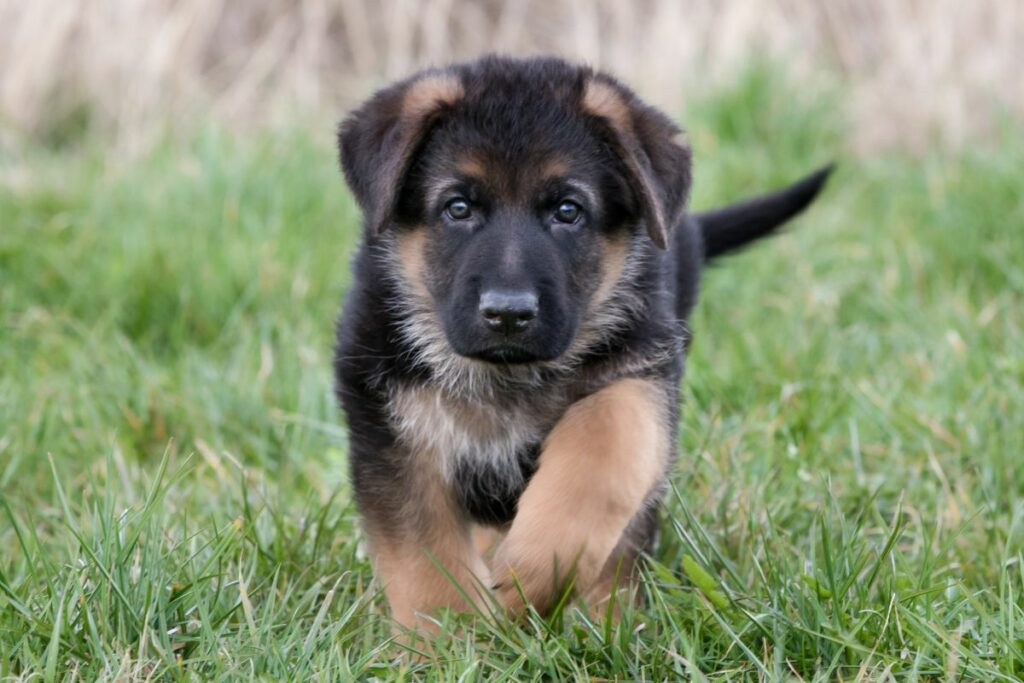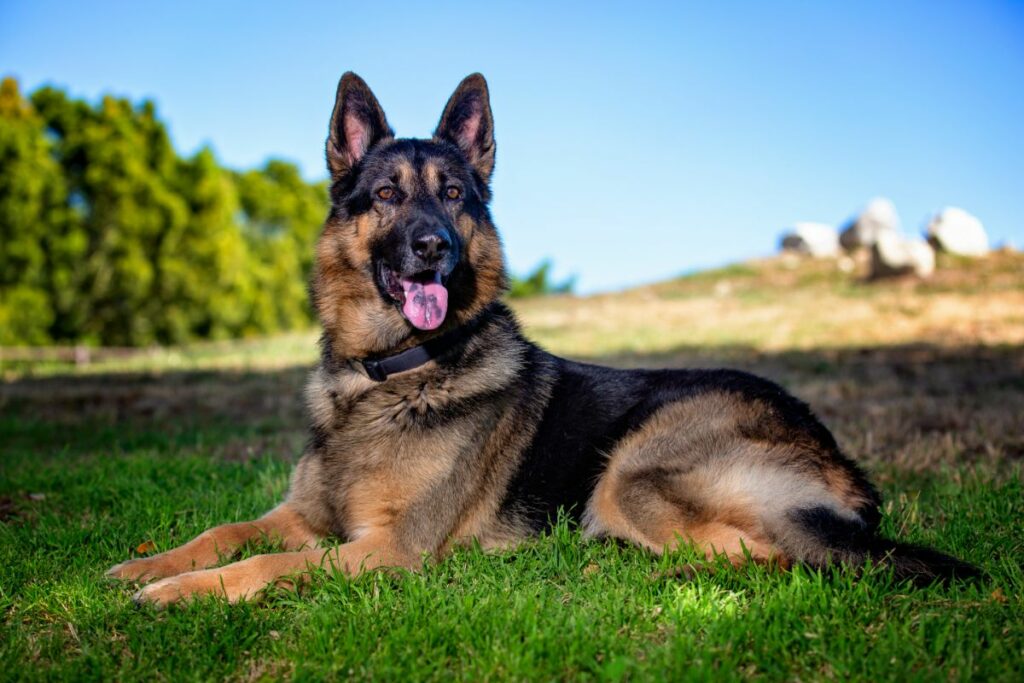German Shepherds are known for their keen intellect and majestic appearance.
Originally bred for herding and protective duties, they have become a top choice for various service roles all over the world and, of course, as devoted companions in our homes.
Are you considering a German Shepherd for your family? In this guide, we’ll share everything you need to know about this distinguished breed so you can make the best decision.

Let’s explore the unique qualities of German Shepherds to understand what makes them so popular.
Breed Facts About German Shepherds
The German Shepherd breed, with its origins rooted in Germany in the late 19th century, was meticulously developed for herding and guarding purposes.
The breed’s founder, Max von Stephanitz, aimed to create a dog that embodied strength, intelligence, and versatility.
His efforts were successful, leading to a breed that quickly became a favorite for various demanding roles in police work and military operations around the globe.
In fact, this breed is so popular that a whopping 4.6% of all AKC-registered dogs in the US are actually German Shepherds!
Fun fact: In Britain, German Shepherds are often called Alsations – the two breed names are used interchangeably. The UK are huge Shepherd (or Alsation) fans too, which an estimate of over 7000 German Shepherds being registered.
German Shepherds are distinguished by their large, robust size and muscular build. They are sometimes confused with the majestic Belgian Malinois.
Their posture is upright and confident, often conveying a sense of alertness and readiness.
These dogs are equipped with a dense double coat, which provides ample protection against harsh weather conditions.
The coat is most commonly seen in tan with black saddle markings, but other color variations such as solid black, sable, and even rare white are also found in the breed.
One of the most striking features of a German Shepherd is their head shape – characterized by a long, strong muzzle and a dome-shaped forehead.
Their ears are large, erect, and open to the front, contributing to their alert appearance.
The breed’s eyes are almond-shaped, typically dark and expressive, conveying an impression of intelligence and curiosity.
Their bushy tails, which are set low and hang with a slight curve when at rest, are another notable feature. When the dog is alert or moving, the tail is carried higher but never over the back.
In terms of temperament, German Shepherds are known for their loyalty, courage, and ability to learn commands quickly, making them not just effective working dogs but also loyal companions.
Their intelligence and eagerness to please have made them a top choice for various roles beyond herding, including search and rescue, assistance for people with disabilities, and even acting (the dog in I Am Legend was a true star!)
Further reading: Dogs that look like German Shepherds.
German Shepherd Average Size, Lifespan, And Key Life Stages
Male German Shepherds weigh in at 65 – 90 pounds (29 – 41kg) and usually reach 24 – 26 inches in height.
The female GSDs are a tad smaller than their male counterparts, weighing in at 50 – 70 pounds (23 – 32kg). Female Shepherds usually reach 22 – 24 inches in height.
Shepherds will usually reach their adult height between the ages of around 12 – 18 months.
They aren’t considered to be adults until 18 months of age, and it’s common for them to continue to fill out after this point and up to the age of about 24 months, which is very common for larger breeds.
The German Shepherd has an average lifespan of 7 – 10 years. Sadly, this breed can face a fair few health problems. We’ll explore those a little more later on in the guide so you know exactly what to look out for.
Now, let’s take a look at the key life stages of this popular breed:
- Two – Three Weeks Old: As with many other pups, at around two weeks old, German Shepherd pups will start to open their eyes, and they will start to hear the sounds in the world around them. At three weeks old, they’ll be ready to get their wriggle on and start to explore their environment a little more.
- Four – Six Weeks Old: By four weeks, the puppies start teething – so be prepared for those needle-like puppy teeth to appear. Be sure to give your pup plenty of soothing toys to teeth on (rather than sacrificing your furniture and shoes!)
- Eight – Ten Weeks Old: At around eight weeks, they receive their first vaccinations – a critical step in their health regimen.
Early socialization and training can begin at this age. Your Shepherd pup will be mischievous (as all pups are), but they will be keen to please, so start with some basic commands, as well as potty training, and work your way up from there. - Six Months Old: Entering adolescence, a German Shepherd puppy continues to grow in size and strength. This period is characterized by increased energy and sometimes stubbornness, making consistent training and socialization crucial.
It’s also a time when their individual personality becomes more pronounced. Regular exercise and continued training help manage their energy and reinforce good behavior. - One to Two Years Old: By 18 to 24 months, a GSD will have reached its full height, but they may continue to gain muscle and fill out in weight.
This is the time to transition to an adult dog food formula, which should be high in protein to maintain their muscular physique and energy levels.
Regular health check-ups are important to monitor their development and catch potential health issues early. - Seven Years And Older (Senior Years): As they enter their senior years, German Shepherds require more focused care. Their diet may need to change to support joint health and maintain a healthy weight.
Exercise routines should be adjusted to suit their aging bodies, focusing more on gentle walks and less strenuous activities.
Regular veterinary check-ups become even more crucial to monitor for age-related health issues.

German Shepherd Personality
Now we know what to expect in terms of physique, size, and behavior from your growing pup, let’s take a closer look at the personality of this popular breed to understand why they are so loved all over the world.
German Shepherds are fiercely loyal dogs – they will protect and defend their family and their territory. As such, they can be quite wary of strangers.
Early socialization, exposing your Shepherd to different people and places, can help with their wariness and prevent too much guarding behavior.
They are also super intelligent and like to please their master, making them an easy breed to train.
As a family dog, GSDs usually get on well with children and other pets as long as proper introductions take place and as long as they receive good socialization as pups.
It’s worth noting that they can suffer from separation anxiety.
German Shepherds are active dogs that are full of energy, so require plenty of play, mental stimulation, and exercise.
Caring For Your German Shepherd
Next, let’s take a look at the essentials for caring for your GSD. We’ll explore diet, exercise, grooming, and a few other things you should consider.
Diet
The cornerstone of a healthy GSD is a nutritious, well-balanced diet.
Puppies, with their rapid growth, require a diet rich in proteins and essential nutrients to support their development.
This breed is known for its robust appetite, so monitoring portion sizes to prevent overfeeding is key.
As they transition from puppyhood to adolescence, at around 18 months, you’ll want to switch from a high-energy puppy formula to an adult dog food that’s tailored to maintain their ideal weight and support joint health.
For senior German Shepherds, a diet formulated for older dogs can help manage weight and provide the necessary nutrients to support aging joints and organs.
As this breed is known for joint problems (more on this later), introducing supplements into the diet may be beneficial – just be sure to speak to your vet first.
Your GSD can enjoy the occasional treat as long as you don’t give them too many.
Exercise
German Shepherds are a bundle of energy and intelligence. They thrive on physical activity and mental challenges.
Daily exercise, including brisk walks, runs, and interactive play, is crucial for their physical well-being and mental stimulation.
You should aim to provide at least two hours of exercise a day. This can include two good, long walks and, if it’s safe, some off-leash fun.
This breed excels in activities like agility, tracking, and obedience training, which not only burn off energy but also keep their minds sharp.
Remember, a bored German Shepherd can become restless, so integrating exercise into their daily routine is essential for their overall happiness.
Grooming
The lush double coat of a German Shepherd is both a beauty and a responsibility.
Regular grooming is necessary to keep their coat in top condition and to minimize shedding.
Brushing a few times a week with a suitable brush helps to remove loose hair and distribute natural oils throughout their coat.
During shedding seasons, typically spring and fall, you may need to brush your GSD more frequently to manage the increased shedding.
Besides coat care, routine nail trimming, ear cleaning, and dental care are crucial in preventing health issues and maintaining overall hygiene.
As we always say, start to get your Shepherd used to a grooming routine from a young age and use lots of words of affirmation.
This helps to prevent anxiety around these activities and shows them that grooming is a positive experience.
Other
Apart from grooming, diet, and exercise, you need to factor in regular vet visits for your GSD, as well as a robust vaccination routine.
Don’t forget your flea and worm treatments, either. You should worm your pooch every three months once they reach adulthood, and you should aim to use a flea treatment monthly (depending on the type of treatment you’re using).
Your vet will be able to advise you of the best flea and worm treatments to use for your dog’s weight.

Common German Shepherd Health Problems
Sadly, German Shepherds are known to suffer from a number of health problems.
We’ve provided an overview of the most common ones below – not to scaremonger, but to arm you with the right information.
Understanding these common health issues is crucial for early detection and effective management.
- Hip and Elbow Dysplasia: This hereditary condition, prevalent in larger breeds, as well as other breeds, involves abnormal development of the hip or elbow joints, leading to pain, lameness, and, in severe cases, arthritis.
While genetics play a key role, factors like rapid weight gain and improper exercise can exacerbate the problem. Regular vet check-ups, maintaining a healthy weight, and appropriate exercise can help manage this condition. In some cases, medication or surgery may be required for relief. - Degenerative Myelopathy: Often seen in older German Shepherds, this progressive disease affects the spinal cord, leading to weakness in the hind legs, which can advance to paralysis. The exact cause is unknown, though it’s believed to have a genetic component. Early signs include loss of coordination and difficulty standing up. While there’s no cure, physiotherapy and supportive care can enhance quality of life.
- Gastric Dilatation-Volvulus (GDV) or Bloat: This acute and life-threatening condition occurs when the stomach fills with gas and twists, cutting off blood flow.
Symptoms include a swollen abdomen, distress, and attempts to vomit. GDV requires immediate veterinary intervention. Preventative measures include feeding smaller, more frequent meals and avoiding vigorous exercise around feeding times.
In Summary
German Shepherds are smart, agile, courageous, and loyal dogs.
They are popular all over the world for their work ethic and stunning appearance.
As well as being excellent working dogs, GSDs also make ideal family pets that can mix well with children and other animals in the household.
If you’re getting a GSD for your family, you’re in for a decade of pure love and loyalty.
Frequently Asked Questions
What is the personality of a German Shepherd?
GSDs are smart, inquisitive, courageous, loyal, and protective dogs.
Is a German Shepherd a good family dog?
German Shepherds are good family dogs who are loyal to their owners.
Are German Shepherds the same as Alsatians?
Yes, German Shepherds and Alsations are the same breed. GSDs are commonly referred to as Alsations in the UK.
Are German Shepherds pet-friendly?
As long as GSDs as well socialized when young, they can get on well with other pets.
How much does a German Shepherd weigh?
Adult Male GSDs usually weigh 65 – 90 pounds, and females generally weigh 50 – 70 pounds.
- A Pawprint Pets Guide To Puppy Breeds – German Shepherds - November 25, 2023
- A Pawprint Pets Guide To Puppy Breeds – Australian Shepherds - November 23, 2023
- Breed Comparison: Belgian Malinois Vs. German Shepherd - November 22, 2023










